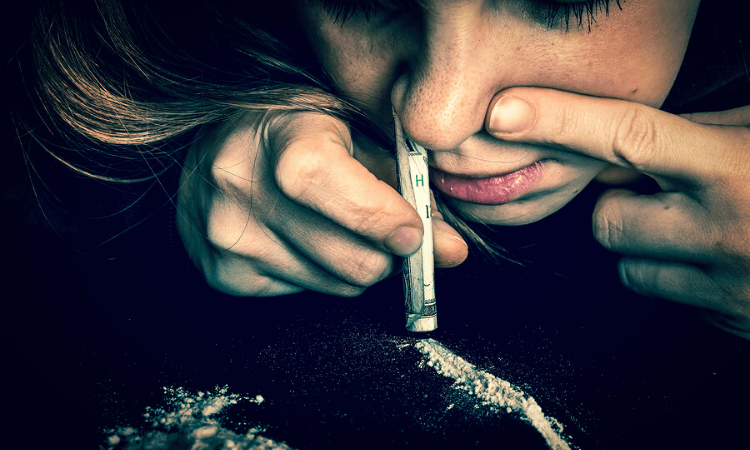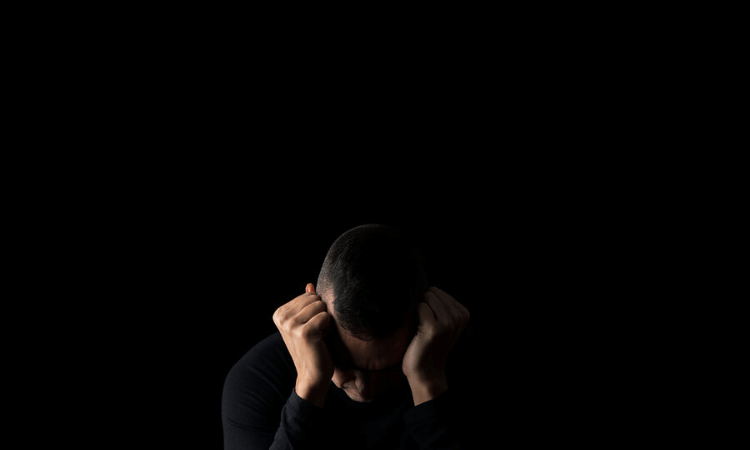
Signs of Cocaine Addiction – It can require diligence to identify a cocaine abuse problem in a loved one, and knowing what signs and symptoms to look for is critical. These signs will gradually become more severe and apparent to others over time as the person descends further and further into addiction. Eventually, they will become impossible to ignore.
Cocaine is a central nervous system stimulant that produces a surge in dopamine, a feel-good chemical in the brain. This action results in a brief boost of energy, increased alertness, hyperactivity, and an elevated mood. These effects make cocaine extremely addictive, and persons who repeatedly use cocaine are at a high risk of becoming dependent.
Signs of Cocaine Use
Initial signs of cocaine use can be subtle when compared to full-blown addiction. Indeed, the physical and mental signs of cocaine use become more increasingly evident in proportion to the behavioral effects of addiction.
Several signs imply the presence of a substance use disorder involving cocaine, including the following:
- Strange or abnormal behavior
- Secretiveness and providing suspicious answers to questions
- Social withdrawal or neglect of old friends in favor of new ones
- Neglect of important responsibilities involving school, work, or family
- Impulsivity
- Manic, hyperactive behavior
- New or worsening financial troubles
- Legal problems
- White powdery smudges on skin, clothing, or other belongings, particularly around the nose and face
Compared to many drugs, cocaine is relatively expensive. Therefore, a regular cocaine habit may require the person to engage in risky behaviors to afford it, including the following:
- Taking side jobs
- Taking out loans
- Selling drugs
- Repeatedly asking to borrow money
- Stealing money or personal possessions from friends and family
- Withdrawing funds from savings accounts, 401K, or retirement
Cocaine Addiction
A cocaine habit often hijacks the user’s brain and compels him or her to engage in compulsive drug-seeking behavior despite the incurrence of negative consequences. These outcomes are huge red flags, and may include the following:
- Being suspended from or dropping out of school
- Quitting or getting fired from a job
- Extreme debt or bankruptcy
- Strained or failed relationships
- Ongoing legal trouble or incarceration
Cocaine abuse and cocaine addiction are two disorders on the same spectrum but are not the same thing. Addiction is characterized by dependence, tolerance, and drug-seeking behavior. Tolerance and dependence develop over time as the person continues to use cocaine and the brain changes and adapts to the substance’s persistent presence.
Cocaine tolerance begins to develop during the early stages of use and grows over time. Tolerance means that users will need increasingly higher doses to achieve the desired effect. Both cocaine abuse and full-blown addiction can cause physiological and emotional distress that may require emergency room visits, hospital stays, or psychological intervention to address.
Symptoms of Cocaine Use

- Insomnia
- Hypersomnia
- Increased anxiety
- Social isolation
- Reduced attention span
- Lethargy and fatigue
- Irritability and agitation
- Loss of appetite
- Severe mood swings
- Hyperstimulation
- Hyperactivity
- Elevated mood
- Hypervigilance
- Paranoia
- Hallucinations
Due to the chemical instabilities induced by cocaine, erratic and explosive mood swings are common among users. When a loved one is struggling with a cocaine problem, they may act cold and distant, and become nearly unrecognizable from the person they once were. When this occurs, loved ones may be pushed away, sometimes too far to recognize the changes in the person’s behavior as they manifest. Unfortunately, the more these changes intensify, the more urgent the situation becomes.
Physical Signs of Cocaine Addiction
Physical symptoms caused by cocaine abuse and addiction can vary from mild to severe. Because every person’s body is different, cocaine doesn’t affect everyone in the same way. Regardless of whether these symptoms are mild or severe, however, the problem remains a serious one that has the potential to be life-threatening.
Common physical symptoms related to cocaine use include the following:
- Dilated pupils
- Excessive sniffling
- Runny or bloody nose
- Dry mouth and throat
- Hoarseness
- Twitching or shaking
- Dark undereye circles
- Headaches or migraines
- Stomach aches
- Nausea
- Elevated body temperature
- Accelerated heart rate
Once a person has developed physiological dependence on cocaine, withdrawal symptoms manifest if the drug is abruptly discontinued.
Symptoms associated with cocaine withdrawal may include the following:
- Depression
- Fatigue
- Seizures
- Cardiovascular problems
- Intense drug cravings
- Excessive sleeping
Cocaine is a very powerful substance that has side effects that may vary depending on how much of the drug was used, the person’s natural body chemistry, and other substances present in the person’s system. Cocaine may also be mixed with harmful adulterants or other drugs that can contribute to overdose or sudden death.
Long-Term Effects of Cocaine Use
The longer cocaine addiction continues, the higher the risk of damage to the brain’s ability to function. Sometimes, in addition to physicians, other specialists and therapists are needed to treat long-term cocaine users effectively. And, unfortunately, some of the adverse consequences induced by cocaine use are irreversible.
Long-term health consequences may include the following:
- Difficulty swallowing
- Lung damage
- Chronic nosebleeds
- Cardiovascular disease
- Seizures and convulsions
- Nasal tissue damage
- Reduced sense of smell
- Profound weight loss
- Malnourishment
- Sexual dysfunction
- Impotence
- Gastrointestinal problems
- Bowel deterioration
- Reproductive complications
- Movement disorders
In general, the more a cocaine addiction becomes entangled into a person’s psychology, the riskier his or her lifestyle will become. As such, cocaine abuse may result in additional health risks, such as the following:
- Unplanned pregnancy
- Fetal cocaine exposure
- Sexually transmitted diseases (STDs) from unprotected sex
- Diseases from unsterile needles, such as HIV and hepatitis
Long-term cocaine use is also associated with deep psychological distress, such as paranoia and hallucinations. Some research has found that cognitive functions such as memory and motor control may be impaired by long-term abuse. Furthermore, cocaine abuse is closely linked to heart failure and premature death.

Signs of a Cocaine Overdose
Although cocaine use can be dangerous at any dose, the drug’s hazardous potential significantly increases when it is consumed in very high amounts. The addictive properties of cocaine make it easy to overlook the excessive amounts one is using to maintain a high, which is very short in duration.
If a person has developed a tolerance, this in of itself can contribute to life-threatening effects as they continue to increase their dose, chasing a high that has become more and more difficult to achieve. An overdose of cocaine is considered a medical emergency and requires immediate treatment.
Signs and symptoms of a cocaine overdose can include the following:
- Panic
- Delirium
- Delusions
- Hyperthermia
- Convulsions and seizures
- Respiratory arrest
- Heart failure
- Cerebral hemorrhage
- Shock
- Kidney failure
- Stroke
- Coma
If an overdose is not treated immediately, the risk of heart failure and death significantly increases. Statistics have also revealed a strong correlation between cocaine overdoses and toxic interactions of cocaine with other substances.
For example, in 2015, more than half of known overdoses involving cocaine in the U.S. also included opioids. In fact, more than one-third (37%) of these deaths involved heroin—combining cocaine and heroin produces a very powerful and deadly mixture known as a speedball.
Treatment for Cocaine Addiction
Cocaine addiction is most effectively treated using a comprehensive approach to addiction. Recovery in Tune offers customized, evidence-based treatment that includes services vital to recoveries, such as psychotherapy, drug counseling, group support, health and wellness programs, and aftercare planning.
Recovery from addiction is a lifelong process, but you don’t have to do it alone. We can help you break free from the chains of addiction and reclaim the fulfilling life you deserve!